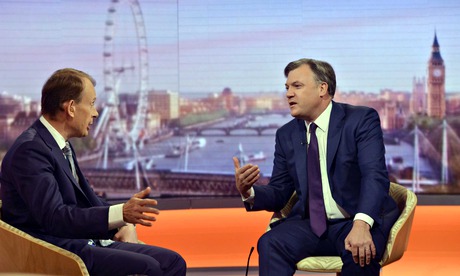Despite its dire record, privatisation is rarely questioned. We must push for our shared interests to take precedence

Ed Balls on The Andrew Marr Show, where he said: 'I don’t want to go back to the nationalisation of the 1970s.' Photograph: Jeff Overs/BBC/PA
It might sound like an oxymoron, but this is a positive article about public services. So effectively has the coalition rebranded an economic crisis caused by private greed as the consequence of public ownership, that nationalisation has come to be seen as a universally discredited hangover from bad old Labour. So while current Labour is considering taking back parts of the rail network into public ownership the shadow chancellor, Ed Balls, last weekend was intoning the neoliberal catechism: "I don't want to go back to the nationalisation of the 1970s."
But bringing outsourced services into public ownership isn't about looking back: it's about moving forward, and is a popular idea (66% of respondents in a poll last year supported the nationalisation of energy and rail companies, including 52% of Tories). For today, in the face of the combined bungles of G4S, Serco and Atos, not even the slickest PR-turned-politician can sustain the myth that private equals efficient.
Yet privatisation is touted as a panacea and cliches are trotted out about the evils of the "nanny state". We need to develop a new language to talk about public ownership, one that detoxifies it and taps into the wide recognition that natural resources and essential public services should not be treated as commodities.
Instead of talking about the state, Hilary Wainwright, in a powerful new booklet – The Tragedy of the Private, the Potential of the Public – describes water, health and education as "the commons" – an excellent term. What's remarkable, and hitherto fairly undocumented, is how all over the world a quiet process of remunicipalisation is taking place. Wainwright gives examples from Newcastle to Norway. In the UK, she found over half of 140 local councils bringing services back from the private sector. In Germany, by 2011 the majority of energy distribution networks had returned to public ownership. Even in the US, a fifth of all previously outsourced services have been brought back in-house.
The case of water is a particularly powerful one: to most people the idea of privatising it is alarmingly similar to the privatisation of air. Wainwright tracks struggles to resist the privatisation of water and defend it as a public good in Brazil, Uruguay and Italy.
What makes all this heartening is that new social forms of ownership are emerging in which public utilities are run by coalitions of workers and service users. Theirs isn't just a defence of public services but an attempt to democratise them so they are not the top-down bureaucracies of old or simply job-saving strategies (important though these may be). They become what Wainwright calls "new forms of collectivity" – unions and public managing common resources together for shared benefit.
There is a palpable momentum to these ideas. Last summer saw the formation of the We Own It campaign, which is lobbying for a public service users' bill. This would promote public ownership as the default option for public services and give the public a say in whether services are privatised. This week, a New Economics Foundation working paperalso set out alternatives to the marketisation of public services.
These constitute a challenge to the fatalistic there-is-no-alternative narrative that has dominated political discussion. In his recent book, Does the Richness of the Few Benefit Us All?, sociologist Zygmunt Bauman argues that the alleged "musts" of political discourse "are nothing other than various aspects of the status quo – of things as they do, but in no way must, stand at the moment".
Wainwright observes that austerity in the aftermath of the second world war applied to everything except the welfare state, which saw generous investment. In a decade or so, will we come to view the privatisation of public utilities as a brief historical interlude of market madness, of ideology trumping not only human values but also value for money?

No comments:
Post a Comment